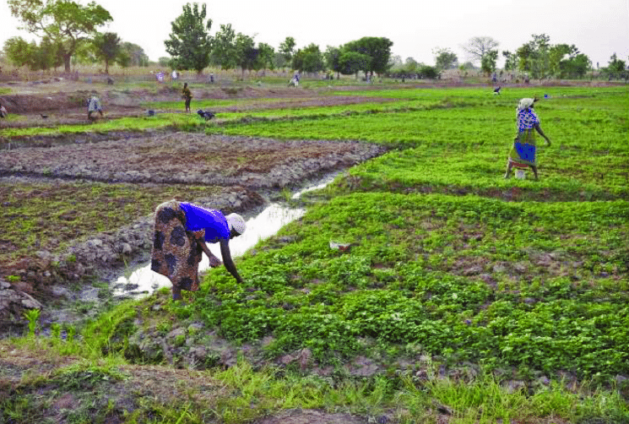
Audio By Carbonatix
The General Secretary of the General Agricultural Workers Union, Edward Kareweh, has said that the Ministry of Agriculture’s policy for 2022 would significantly contribute to a low agricultural output for the year 2022.
According to him, the policy which was made withithout consulting key stakeholders from the agric sector, poses several challenges to farming communities across the country.
Explaining the policy, he mentioned that government’s plan to reduce fertilizer subsidies to 15% as well as the reduction of the quantity of fertilizer to be supplied will mean that farmers would have to downsize their production in order to address the challenge.
Speaking on PM Express Business Edition, on Thursday, he explained, “If we look at the policy of the Ministry as we talk now, it is already indicating that they have planned through their policy for a low output at the end of 2022.
“One, the Ministry on its own without even consultations with those who are beneficiaries of the subsidy decided that we are going to reduce the subsidy, which is not even 50%, because they told us that it was 50%.
“As at last year it was 36-38%, now on their own they have reduced it to 15% and then apart from that, the Ministry is telling us that this year’s subsidized fertilizer, the quantity will not be more than 50% of what was supplied last year.
“So it means that they are scaling down first on price, I mean, the subsidy level to 15%, and second the quantity as against previous year, then the third one, has to now do with the fact that these external factors are confronting us.”
He added that the food price inflation currently being experienced will continue for as long as the situation the policy will create persists.
“So if today this is your policy, one because of the general cost of production, the farmers will cut down their total acreage that they will farm this year, because land preparation cost is there, transport cost is there, labour cost is there, pesticides cost is there, which have all ballooned, so farmers are all constrained.
“So they will first cut down their number of acreage. Two, because there is going to be low fertilizer application as a result of the inability of the farmer to be able to purchase the number of bags that he used to buy because the subsidy has come down, and because price of the fertilizer itself has even gone up over double, all this put together means there is going to be low yield and then aggregate will have low output for 2022,” he said.
Latest Stories
-
Seized trucks: Government bans land transit of cooking oil
9 minutes -
U.S. Embassy warns Ghanaian travellers against visa overstays during 2026 World Cup
16 minutes -
We’re in talks with Adeleke’s family to resolve Sophia, Davido custody dispute – Dele Momodu
28 minutes -
Rare prison sentences handed to Cameroon soldiers after killing of 21 civilians
38 minutes -
5 bodies of migrants washed ashore in east of Libya’s capital Tripoli, police officer says
49 minutes -
Greenland says ‘no thanks’ to Trump US hospital boat
60 minutes -
Powerful winter storm slams US northeast as NYC issues travel ban
1 hour -
Kim Jong Un re-appointed leader of North Korea’s ruling party
1 hour -
Mexico’s most wanted drug lord ‘El Mencho’ killed in military operation
1 hour -
Attackers kill at least 50, abduct women and children in Nigeria’s Zamfara state
2 hours -
Simi dragged online after TikToker Mirabel admits faking rape claim
5 hours -
AngloGold earnings surge on record prices, reports 5 million ounce US gold reserves
5 hours -
Barca dominate Levante to claim La Liga top spot
6 hours -
Managing Man Utd the ‘ultimate role’ – Carrick
6 hours -
‘Educate yourself and your kids’ – Fofana and Mejbri racially abused
6 hours

